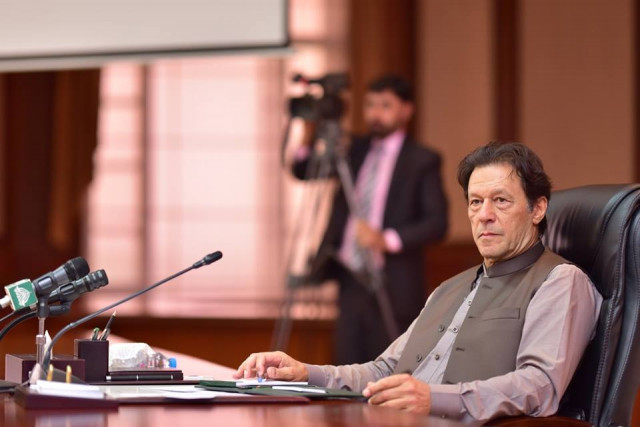Centre defers decision to remove Bilawal, Murad from ECL
Govt had placed 172 names, including top PPP leadership, on no-fly list in light of JIT report in fake accounts case

PM Imran Khan. PHOTO: PID
In a meeting chaired by Prime Minister Imran Khan, the government decided to further mull on the subject.
Govt to review money laundering ECL list on case-by-case basis
The government had placed PPP leaders on the no-fly list in light of the JIT report in fake accounts sou motu notice case being heard by the Supreme Court.
The JIT report that was submitted to the apex court, implicated almost the entire top leadership of the PPP including Bilawal and co-chairman Asif Ali Zardari in the alleged money laundering of billions of rupees through fictitious bank accounts.
The top court, however, took strong exception to putting these individuals’ names – particularly that of Sindh chief minister and other eminent politicians – on the ECL and warned that no one will be allowed to derail democracy which is the main component of the Constitution.
The Chief Justice Mian Saqib Nisar-led bench had directed government to reconsider the ECL list. Last week, the federal cabinet had decided to not immediately remove the names from the no-fly list. It concluded to review JIT recommendations on a case-by-case basis before removing the individuals from the list.
Zardari, Talpur interim bail extended in money laundering case
The fake accounts saga
In December 2015, the Federal Investigation Agency began a discreet investigation into certain bank accounts through which multi-billion rupee transactions have been made. According to FIA sources, information regarding the fake accounts came to the fore when an intelligence agency picked up a prominent money changer in an unrelated case.
As the monitoring and investigation of these suspicious accounts continued, it surfaced that five of these accounts in two banks – the Sindh Bank and Summit Bank – had been used for transactions worth around Rs15 billion.
Investigation showed the accounts were operated by fake companies. Funds were credited into these accounts from contractors with multi-billion rupee contracts with the Sindh government. The money was found to have been transferred to accounts of companies owned and operated by the Omni Group, whose chairperson, Anwar Majeed, is a close aide of Pakistan Peoples Party (PPP) co-chairperson Asif Ali Zardari. Another beneficiary was Nasir Lootah, the chairperson of Summit Bank.
The probe, however, was shelved. It resumed almost a year and a half later. FIA’s State Bank circle initiated a formal inquiry in January, 2018.
By June, the FIA had several high-profile names on its list but was unable to make headway – for several reasons. It was at his point that the Supreme Court intervened. Chief Justice Mian Saqib Nisar took suo motu notice of the ‘slow progress’ in the money laundering case.
In July, Zardari’s close aides; Hussain Lawai, Taha Raza and two others were arrested. Subsequently, the first case was registered in the mega-corruption scandal.
The FIA submitted its report to the apex court on July 8 which revealed a web of companies and accounts that were being used to transfer billions of rupees.
In all, 29 accounts were identified that received payments, totaling at least Rs35 billion.
In August, Omni Group chief Anwar Majeed was arrested along with son Abdul Ghani Majeed when they returned to the country on being summoned by the apex court. They are now on judicial remand.
Meanwhile, Asif Ali Zardari and Faryal Talpur have appeared before the investigators and have since secured interim bail from the Banking Court. The last hearing of the case was on December 21, when the duo got their fourth extension in the bail till January 7.
Amid complaints from the FIA and barbs flying in the Supreme Court, CJP Nisar ordered the formation of a Joint Investigation Team to quicken the pace of the investigation. One of FIA’s principal complaints was the lack of cooperation from the Sindh government.
Zardari ‘visibly agitated’ during FIA interrogation
The JIT report in a nutshell
According to the report, the JIT identified 11,500 bank accounts and 924 account holders at the start of their investigation.
Its experts generated 59 Suspected Transaction Reports (STR) and 24,500 Cash Transaction Reports. That means the transactions were flagged as suspicious.
Due to the high quantum of transactions, the JIT decided on a threshold of Rs10million “to track, follow and minutely investigate the flow of funds beyond the immediate counterparties and determine the source of funds and ultimate beneficiaries.”
It questioned 767 individuals, including Zardari and Talpur, while Bilawal submitted written responses.
It has since had the names of 147 individuals placed on the Provisional National Identification List, which would allow authorities to identify if those individuals try to enter or exit the country through an airport. After the report was submitted to the SC, the names of 172 individuals have been placed on the no-fly list by the interior ministry on the JIT’s request.
Fake accounts case: Bilawal, Zardari placed on ECL
The investigations have focused on 32 accounts of 11 fake entities. The first account, belonging to M/S Lucky Enterprises, opened in January 2010 and remained active till January 2017. It was used for 13,809 transactions.
The investigation uncovered that the 11 sole proprietorship entities were registered in the names of low-level employees of the Omni Group, as well as random individuals including a deceased person. All the accounts were operated by Omni Group executives.
A thorough review of the JIT report shows that representatives of State Bank and Securities and Exchange Commission of Pakistan (SECP) played a vital role in the investigation and preparation of the final report and recommendations.
Read the full text of the JIT report here.



















COMMENTS
Comments are moderated and generally will be posted if they are on-topic and not abusive.
For more information, please see our Comments FAQ